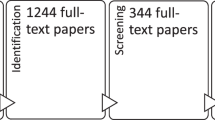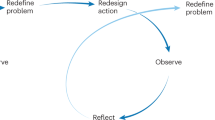Abstract
The hollowing of civil society has threatened effective implementation of scientific solutions to pressing public challenges—which often depend on cultivating pro-social orientations commonly studied under the broad umbrella of social capital. Although robust research has studied the constituent components of social capital from the demand side (that is, the orientations people need for collective life in pluralistic societies, such as trust, cohesion and connectedness), the same precision has not been brought to the supply side. Here we define the concept of civic opportunity—opportunities people have to encounter civic experiences necessary for developing such orientations—and harness data science to map it across America. We demonstrate that civic opportunity is more highly correlated with pro-social outcomes such as mutual aid than other measures, but is unequally distributed, and its sources are underrepresented in the public dialogue. Our findings suggest greater attention to this fundamentally uneven landscape of civic opportunity.
This is a preview of subscription content, access via your institution
Access options
Access Nature and 54 other Nature Portfolio journals
Get Nature+, our best-value online-access subscription
$29.99 / 30 days
cancel any time
Subscribe to this journal
Receive 12 digital issues and online access to articles
$119.00 per year
only $9.92 per issue
Buy this article
- Purchase on Springer Link
- Instant access to full article PDF
Prices may be subject to local taxes which are calculated during checkout




Similar content being viewed by others
Data availability
The replication data are available at https://dataverse.harvard.edu/dataset.xhtml?persistentId=doi:10.7910/DVN/TCXRTM.
Code availability
The replication code is available at https://github.com/snfagora/map_civic_opportunity.
References
Putnam, R. D. Bowling Alone: The Collapse and Revival of American Community (Simon and Schuster, 2000).
Chetty, R. et al. Social capital I: measurement and associations with economic mobility. Nature 608, 108–121 (2022).
Sampson, R. J. Great American City: Chicago and the Enduring Neighborhood Effect (Univ. Chicago Press, 2012).
Bourdieu, P. in Handbook of Theory and Research for the Sociology of Education (ed. Richardson, J. G.) 241–260 (Greenwood Press, 1986).
Putnam, R. D., Leonardi, R. & Nanetti, R. Y. Making Democracy Work: Civic Traditions in Modern Italy (Princeton Univ. Press, 1994).
Brandtner, C. & Dunning, C. in The Nonprofit Sector: A Research Handbook (eds Powell, W. W. & Bromley, P.) 271–291 (Stanford Univ. Press, 2020).
Schneiberg, M. in Organizational Imaginaries: Tempering Capitalism and Tending to Communities through Cooperatives and Collectivist Democracy (eds Chen, K. K. & Chen, V. T.) vol. 27, 187–228 (Emerald Publishing Limited, 2021).
Marwell, N. P. Bargaining for Brooklyn: Community Organizations in the Entrepreneurial City (Univ. Chicago Press, 2009).
Finkel, E. J. et al. Political sectarianism in America. Science 370, 533–536 (2020).
Kinder, D. R. & Kam, C. D. Us Against Them: Ethnocentric Foundations of American Opinion (Univ. Chicago Press, 2010).
Bavel, J. J. V. et al. Using social and behavioural science to support COVID-19 pandemic response. Nat. Hum. Behav. 4, 460–471 (2020).
de Tocqueville, A. Democracy in America (Univ. Chicago Press, 2000).
Han, H. & Kim, J. Y. Civil society, realized: equipping the mass public to express choice and negotiate power. Am. Acad. Polit. Soc. Sci. 699, 175–185 (2022).
Fung, A. Associations and democracy: between theories, hopes, and realities. Annu. Rev. Socio. 9, 515–539 (2003).
Portes, A. Social capital: Its origins and applications in modern sociology. Annu. Rev. Socio. 24, 1–24 (1998).
Sobel, J. Can we trust social capital? J. Econ. Lit. 40, 139–154 (2002).
Kyne, D. & Aldrich, D. P. Capturing bonding, bridging, and linking social capital through publicly available data. Risk Hazards Crisis Public Policy 11, 61–86 (2020).
Rupasingha, A., Goetz, S. J. & Freshwater, D. The production of social capital in US counties. J. Socio-Econ. 35, 83–101 (2006).
Jackson, M. O. A typology of social capital and associated network measures. Soc. Choice Welf. 54, 311–336 (2020).
Bailey, M., Cao, R., Kuchler, T., Stroebel, J. & Wong, A. Social connectedness: measurement, determinants, and effects. J. Econ. Perspect. 32, 259–280 (2018).
Lin, N. Building a network theory of social capital. Connections 22, 28–51 (1999).
United States Congress. Volume I: An Overview of Social Capital in America (Joint Economic Committee, 2017).
Skocpol, T. Diminished Democracy: From Membership to Management in American Civic Life (Univ. Oklahoma Press, 2003).
Hersh, E. Politics Is for Power: How to Move Beyond Political Hobbyism, Take Action, and Make Real Change (Simon and Schuster, 2020).
Ren, C. & Bloemraad, I. New methods and the study of vulnerable groups: using machine learning to identify immigrant oriented nonprofit organizations. Socius 8, 10–21 (2022).
Pattillo, M. Black on the Block: The Politics of Race and Class in the City (Univ. Chicago Press, 2010).
Levine, J. R. Constructing Community: Urban Governance, Development, and Inequality in Boston (Princeton Univ. Press, 2021).
Pierri, F. et al. Online misinformation is linked to early COVID-19 vaccination hesitancy and refusal. Sci. Rep. 12, 1–7 235 (2022).
Pertwee, E., Simas, C. & Larson, H. J. An epidemic of uncertainty: rumors, conspiracy theories and vaccine hesitancy. Nat. Med. 28, 456–459 (2022).
Watts, D. J., Rothschild, D. M. & Mobius, M. Measuring the news and its impact on democracy. Proc. Natl Acad. Sci. USA 118, e1912443118 (2021).
Ma, J. Automated coding using machine learning and remapping the us nonprofit sector: a guide and benchmark. Nonprofit Volunt. Sect. Q. 50, 662–687 (2021).
Ober, J. What the ancient Greeks can tell us about democracy. Annu. Rev. Polit. Sci. 11, 67–91 (2008).
Schlozman, K. L. et al. Organizations and the democratic representation of interests: what does it mean when those organizations have no members? Perspect. Polit. 13, 1017–1029 (2015).
Schlozman, K. L., Verba, S. & Brady, H. E. The Unheavenly Chorus: Unequal Political Voice and the Broken Promise of American Democracy.
Berman, S. Civil society and the collapse of the Weimar Republic. World Polit. 49, 401–429 (1997).
Riley, D. The Civic Foundations of Fascism in Europe: Italy, Spain, and Romania, 1870–1945 (Johns Hopkins Univ. Press, 2010).
Goldberg, D. Texas A&M University Geoservices (2022).
MapAgora. GitHub https://snfagora.github.io/MapAgora/ (2023)
autotextclassifier. GitHub https://snfagora.github.io/autotextclassifier/ (2023)
Salomon, J. A. et al. The US COVID-19 trends and impact survey: continuous real-time measurement of COVID-19 symptoms, risks, protective behaviors, testing, and vaccination. Proc. Nati. Acad. Sci. USA 118, e2111454118 (2021).
US CDC. COVID-19 vaccinations in the United States, county; https://data.cdc.gov/Vaccinations/COVID-19-Vaccinations-in-the-United-States-County/8xkx-amqh (2022).
Fraser, T., Page-Tan, C. & Aldrich, D. P. Social capital’s impact on COVID-19 outcomes at local levels. Sci. Rep. 12, 1–15 (2022).
Acknowledgements
The authors received no specific funding for this work. We are grateful to J. Booth-Tobin, other members of the P3 Research Lab at Johns Hopkins, and attendees at the American Politics Speaker Series at the Harvard Kennedy School for feedback on the project.
Author information
Authors and Affiliations
Contributions
Conceptualization: M.d.V., J.Y.K. and H.H. Methodology: M.d.V. and J.Y.K. Investigation: M.d.V., J.Y.K. and H.H. Visualization: M.d.V. and J.Y.K. Funding acquisition: H.H. Project administration: M.d.V. and H.H. Supervision: M.d.V. and H.H. Writing—original draft: M.d.V., J.Y.K. and H.H. Writing—review and editing: M.d.V., J.Y.K. and H.H.
Corresponding author
Ethics declarations
Competing interests
All authors declare no competing interests.
Peer review
Peer review information
Nature Human Behaviour thanks Ji Ma and the other, anonymous, reviewer(s) for their contribution to the peer review of this work. Peer reviewer reports are available.
Additional information
Publisher’s note Springer Nature remains neutral with regard to jurisdictional claims in published maps and institutional affiliations.
Supplementary information
Supplementary Information
Supplementary Figs. 1 and 2 and Tables 1–16.
Rights and permissions
Springer Nature or its licensor (e.g. a society or other partner) holds exclusive rights to this article under a publishing agreement with the author(s) or other rightsholder(s); author self-archiving of the accepted manuscript version of this article is solely governed by the terms of such publishing agreement and applicable law.
About this article
Cite this article
de Vries, M., Kim, J.Y. & Han, H. The unequal landscape of civic opportunity in America. Nat Hum Behav 8, 256–263 (2024). https://doi.org/10.1038/s41562-023-01743-1
Received:
Accepted:
Published:
Issue Date:
DOI: https://doi.org/10.1038/s41562-023-01743-1
This article is cited by
-
The Rhetoric of Solidarity: Nature and Measurement of Social Cohesion in the Self-representation of Civil Society Organizations
Social Indicators Research (2023)



